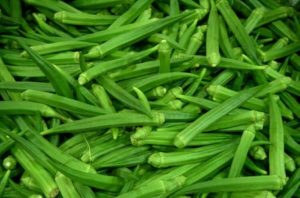 Scientific name: Abelmoschus esculentus
Scientific name: Abelmoschus esculentus
Usage
Whether you consume stewed, boiled, fried, or even in pickled form, you can reap the health benefits of this little green vegetable any time of the year. Benefits include:
Alleviates Asthma
Consuming even small amounts of fruits or vegetables rich in vitamin C such as okra (21 milligrams per cup) can alleviate symptoms of asthma. A 2000 study published in the journal Thorax found the intake of citrus or kiwi fruits conferred a highly protective effect against wheezing symptoms in childhood. The protective effect was seen even among children who ate fruits only once or twice per week. The researchers found this to be especially true among already susceptible patients.
Lowers Cholesterol
Okra not only promotes good digestive health, but also good cholesterol levels due to its high fibre content. Soluble fibre can be dissolved in water, which means that it breaks down in the digestive tract. There, it also binds to cholesterol in other foods so that it can be excreted along with other waste. In turn, total cholesterol levels plummet, according to the Harvard Health Publications. Containing zero cholesterol and very little fat, okra also helps to lower cholesterol by replacing all the foods that contain high levels of fat and cholesterol.
Manages Diabetes
Soluble fibre can help diabetics because of its ability to keep blood glucose levels stable — it affects how sugar is absorbed in the intestines. In a 2011 study published in the journal ISRN Pharmaceutics, researchers soaked sliced okra pods in water and then gave rats the solution through a gastric feeding tube — a controlled group wasn’t fed this solution. The researchers found that okra helped reduce the absorption rate of glucose and in turn reduced blood sugar levels in the treated rats.
Boosts Immune System
Okra’s rich vitamin C content and antioxidant components also double as decent immune boosters against unsafe free radicals, while also supporting the immune system. Vitamin C stimulates the immune system to create more white blood cells, which can help battle other foreign pathogens and materials in the body.
Prevents Kidney Disease
Regularly eating okra can be helpful for preventing kidney disease. A 2005 study published in the Jilin Medical Journal found that patients who ate okra daily reduced clinical signs of kidney damage more than those who were on a diabetic diet. This is helpful since nearly half of kidney disease cases develop from diabetes.
Promotes Healthy Pregnancy
Okra’s high levels of vitamin A, B (B1, B2, B6), and C, as well as traces of zinc and calcium, make it an ideal vegetable to eat during pregnancy. Okra also serves as a supplement for fibre and folic acid. This helps prevent birth defects such as spina bifida and can even stop constipation during pregnancy (Borreli, 2015).
Country of Origin
The geographical origin of is disputed among supporters of West African, Ethiopian, and South Asian origins. The plant is cultivated in tropical, subtropical, and warm temperate regions around the world (Press, 2016).
Time to harvest
Flowering begins from 35 to 40 days after sowing. The crop is harvested in 55 to 65 days after planting when pods are 2 to 3 inches long. At this stage, the pods are still tender. Larger okra pods tend to be tough and fibrous. Round-podded okra varieties remain tender at larger pod sizes and are good for slicing and freezing. Since Okra grows very fast, it should be harvested every two days. The pods should not be allowed to mature on the plant as this will inhibit more pods from developing and reduce the productivity of the plant. Handling of okra should be done carefully because the pods bruise easily (Reddy, 2015).
Share with:

